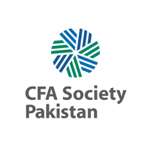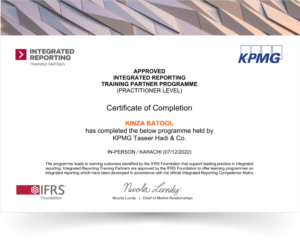The programme leads to learning outcomes identified by the IFRS Foundation that support leading practice in integrated reporting. Integrated Reporting Training Partners are approved by the IFRS Foundation to offer learning programmes on integrated reporting which have been developed in accordance with the official Integrated Reporting Competence Matrix.


The programme leads to learning outcomes identified by the IFRS Foundation that support leading practice in integrated reporting. Integrated Reporting Training Partners are approved by the IFRS Foundation to offer learning programmes on integrated reporting which have been developed in accordance with the official Integrated Reporting Competence Matrix.
Course Directors

Rana Nadeem Akhtar
KPMG in Pakistan

Syed Ahson Ali Shah
KPMG in Pakistan
Our Partners





Course Outline
Day ONE | Understanding the Concepts
09:00 am – 10:00 am
Introduction
– Registration
– Participant introduction
– Training Expectations – What brings you Here?
– Our Learning Pathway
– The Journey so Far: Where does ESG stand globally
– Current State of ESG and Sustainability Reporting in Pakistan
– Evolution of the Integrated Reporting Framework
10:00 am – 11:00 am
Fundamental Concepts
– Group Discussion – What do you understand by Integrated Reporting?
– Introduction to Integrated Reporting
– The case for change – the Emergence of Integrated Thinking
– Basic Concepts/ Key Terms Used in the Framework
11:30 am – 01:00 pm
– Building Blocks of IR – Guiding Principles
– Differentiating Outputs from Outcomes
Exercise 1
02:00 pm – 03:30 pm
Creating Value Overtime
– Sample Integrated Report – Group Discussion
– The Process of Value Creation
– Measuring Value Creation
– A Closer Look at the Capitals
Case Study
Exercise 2
04:00 pm – 05:00 pm
Content Elements of an Integrated Report
– Content Elements – Organizational Overview and External Environment
– Governance
– Business Model
– Risks and Oppurtunities
– Strategy and Resource Allocation
– Organizational Performance
– Company Outlook
– Basis of Preparation and Presentation
Case Studies
Exercise 3
End of Day – Round Robin
Day TWO | Transitioning to Integrated Reporting
09:00 am – 09:30 am
Recap
Welcome and Recap
09:30 am – 11:00 am
Transition to Integrated Reporting
– Identifying the Catalyst
– Setting the Foundation
– From Concept to Implementation
11:30 am – 01:00 pm
Road Map to Implementation
– Road Map to Getting Organized
– Establishing a Plan
– Identifying the Information Needs
– Assessing Systems and Controls
– Preparing Report Content
– Improving the Process
02:00 pm – 05:00 pm
Developing an Integrated Report
Case Studies Exercise 4 – Preparing an Integrated Report
05:00 pm – 05:30 pm
Conclusion
– Quick Recap
– Close course and collate feedback
WHAT IS AN INTEGRATED REPORT?
An integrated report is a communication on how an organisation’s strategy, governance, performance and prospects in the context of its external environment lead to the creation of value over the short, medium and long term. It has been created for organisations that aspire to embrace integrated thinking and progress through corporate reporting. It benefits all stakeholders who are interested in understanding an organisation’s ability to create value over time.
An integrated report is prepared in accordance with the International Integrated Reporting framework. The framework has been developed by the IFRS Foundation’s Integrated Reporting and Connectivity Council, a consortium of regulators, investors, companies, standard setters, the accounting profession and NGOs. The framework provides guiding principles and content elements that govern the content of an integrated report.
Integrated Reporting offers an opportunity to align corporate reporting to business strategy and value creation. It provides a holistic picture of the value created by an organisation over time to the providers of financial capital. It enables a better understanding of the business model and management of externalities, empowering them to make efficient and forward-looking investments and other decisions.
COURSE OVERVIEW
The landscape of corporate reporting continues to rapidly shift; with increasing pressure from investors, stakeholders, and conscious-consumers alike, companies are now being expected to disclose the full dearth and extent of their organizational activities, alongside the impacts of these activities on the environment, on relevant communities, and on the broader goals for governance and policy-level coordination.
In Pakistan, the government and businesses alike have demonstrated a keen commitment to demonstrate how they intend to create and communicate value. This process has involved such companies to actively and thoroughly report on how they invest in their human and intellectual resources, how they manage their consumption and emissions, and how they contribute towards a just, corruption-free, and equal society.
A number of reporting frameworks and standards now dominate the ESG narrative, and investors have increasingly demanded companies to adhere to reporting outlines which are measurable, comparable, transparent, and holistic. It is here that the Integrated Reporting Framework Standards are observed as the internationally-benchmarked reporting outlines, providing audiences with accurate, comparable, and consistent ESG data.
Regulation has also undergone a shift wherein companies are now transitioning from voluntary to compulsory reporting; in Pakistan, the SECP required all public companies to disclose CSR activities in annual financial statements through the ‘Corporate Social Responsibility (CSR)-Order, 2009’. In 2016, the Pakistan government adopted the SDGs and implemented a sustainability initiatives under ‘Pakistan Vision 2025’ and a corresponding reporting requirement under corporate law.
Identifying a company’s ESG risks and opportunities has become the need of the hour, and combining such data in a manner that seamlessly communicates the organization’s vision, strategic goals, and comparability with peers is where Integrated Reporting becomes all the more crucial.
AUDIENCE
This training is targeted towards industry and corporate professionals seeking to comply with internationally-benchmarked practices of reporting against their ESG-centric activities. Effectively integrating ESG and Sustainability throughout the organization requires awareness and capability-scaling at a managerial and board-level. Since effective ESG integration involves a company-wide coordination for reporting, all professionals – regardless of sector, department, or designation – are encouraged to attend.
Banking and Finance
Banks are uniquely positioned to set precedents and establish guidelines that can impact how other sectors respond and respond on ESG targets.
Oil & Gas and Power Generation
Sectors generating a relatively higher carbon footprint are facing increased pressure from investors and stakeholders alike to exhibit how they are curbing on harmful activities.
Manufacturing and Industrials
Industries involved in manufacturing are now increasingly being expected to report on how materials are sourced, how waste and emissions are managed, and how supply chains remain sustainable and safe.
Transportation
With a global shift towards clean, renewable sources of energy now dominating the conversation, this sector is also expected to keep pace with shifting currents and market pulses.
LEARNING OUTCOMES
• Develop a thorough understanding of the difference between
ESG and Sustainability
• Gain familiarity with leading regulatory mandates and
corporate reporting frameworks
• Learn how to effectively and efficiently apply Content
Elements, Guiding Principles, and the Capitals in the preparation and presentation of an Integrated Report
• Understand how value is created and communicated
• Engaging with stakeholders and identifying materiality
• How Integrated Reporting can be streamlined
• Understanding audience, oversight, and strategic organizational integration
Around the world, organizations are transitioning to a more complete, concise and streamlined approach to corporate reporting. Many have adopted the Integrated Reporting Framework to embed integrated reporting and integrated thinking into their annual reporting cycles, operating activities and strategic planning. Reduced silos, improved decisions and a holistic approach to communication are cited as important benefits of integrated reporting.
TRAINERS’ PROFILES

Rana Nadeem Akhtar
KPMG in Pakistan
Nadeem is a Partner at KPMG in Pakistan having more that 25 years of experience in assurance and advisory services. His goal is to support clients to deliver sustainable change for their customers and achieve tangible growth and profitability.
He is part of KPMG’s global ESG and Sustainability leadership group and has led various sustainability advisory projects in Pakistan since 2010. He is the knowledge partner of the PSX-PICG ESG Taskforce, involved in creating awareness and developing guidelines and regulations in the country. Nadeem has also been part of NYC Executive Certificate program in Advanced Sustainability and IFC led course on TCFD climate-related financial reporting. He has first-hand experience working with the various standards and reporting guidelines that are currently available and used in sustainability reporting and disclosures.
He is an FCA, holds a masters degree in Economics, a certified Integrated Reporting Framework Practitioner and is accredited training partner of the VRF under the IFRS Foundation. As a coach, trainer and storyteller, he enjoys working with teams to help them adopt to evolving standards and approaches required for their professional capacities.

Syed Ahson Ali Shah
KPMG in Pakistan
Ahson is an FCA and holds degrees in chemical engineering, MBA, and IT. With more than 16 years of expertise in Assurance and Advisory Services, he is a Partner with KPMG in Pakistan. He participates in the Climate Change Center of Excellence and the KPMG MESA Digital and Innovation Steering Committee, respectively. He also serves as the IMPACT Champion for KPMG in Pakistan on several KPMG platforms. He currently serves as the team leader for a group of experts in Pakistan for KPMG ESG and Sustainability Advisory. As a member of the ICAP Accounting Technical Committee on ISSB Standards, the ISSB ASEAN & OCENIA Working Group, and on the regulatory front in the area, he is currently making contributions to the sustainability field.
Ahson has extensive experience as a trainer in the field of sustainability. Some of his courses include those from Harvard Extension School on strategy and innovation, the circular economy (IE Spain), policy coherence, SDG 16 Anti Corruption, Sustainable Cities and Economies, and many others from the UNSSC on topics like climate change, the social agenda, and environmental standards. He has professional experience in WEF and TCFD related reporting and has been accredited by the VRF under the IFRS Foundation as an Integrated Reporting Framework Practitioner, an Accredited Training Partner of the VRF, and a qualified GRI Trainer.
Registration Details
Regular Fee: Rs. 80,000 + SST per participant
Early Bird Discount: Rs. 70,000 +SST per participant
Group Discount: 10% Discount on 3 or more nominations from the same organization
(For larger groups, please send us a note at info@terrabizgroup.com)
Includes Courseware, Certificate by IFRS Foundation,
Lunch, Refreshments and Business Networking.
For registration(s), send us your
Name, Designation, Organization, Mobile, E-Mail and Postal Address to
register@terrabizgroup.com
For further information please contact Mr. Talha Shabbir
Mobile: 0321 874 7595 / 0300 213 3849
Email: info@terrabizgroup.com
Terrabiz Cancellation Policy: For cancellations made in the 7 working days to the workshop, no refunds will be given. Cancellations must be confirmed by email. Substitutions may be made at any time.


